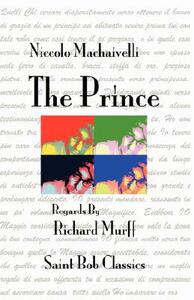Take a photo of a barcode or cover
challenging
dark
informative
inspiring
reflective
slow-paced
dark
informative
reflective
fast-paced
informative
medium-paced
I actually pretty surprised how much I didn’t disliked this book. I’m definitely not the target audience for it, specially considering that the target audience is a prince in 1513 . Also I didn’t appreciate the sexist remarks at the end of one of the chapters and I don’t really agree with some things Machiavelli said in this book.
But he did have some good ideas that would helpful applied now a days. And the rest of it you can forgive him, because he lived in the 15th century.
But he did have some good ideas that would helpful applied now a days. And the rest of it you can forgive him, because he lived in the 15th century.
challenging
informative
inspiring
reflective
slow-paced
"[H]e who neglects what is done for what ought to be done, sooner effects his ruin than his preservation; for a man who wishes to act entirely up to his professions of virtue soon meets with what destroys him among so much that is evil. Hence it is necessary for a prince wishing to hold his own to know how to do wrong, and to make use of it or not according to necessity." (p. 52)
Lauded as one of the most influential books of all time, The Prince has lots of advice for many types of leaders at the expense of breaking your moral compass. Each chapter handles a certain situation a leader may find themselves in, albeit using the terms and conflicts of Machiavelli's time. Nonetheless, the pieces of advice Machiavelli notes are timeless, as he highlights how leaders should think, act, and protect their liabilities. The last chapter of The Prince has a letter from Machiavelli about Prince Castruccio Castracani Of Lucca, a paragon of Machiavelli's advice. You must know the road to Hell before you can avoid it, and Machiavelli gave us knowledge of the road to government corruption.
Lauded as one of the most influential books of all time, The Prince has lots of advice for many types of leaders at the expense of breaking your moral compass. Each chapter handles a certain situation a leader may find themselves in, albeit using the terms and conflicts of Machiavelli's time. Nonetheless, the pieces of advice Machiavelli notes are timeless, as he highlights how leaders should think, act, and protect their liabilities. The last chapter of The Prince has a letter from Machiavelli about Prince Castruccio Castracani Of Lucca, a paragon of Machiavelli's advice. You must know the road to Hell before you can avoid it, and Machiavelli gave us knowledge of the road to government corruption.
dark
informative
reflective
fast-paced
informative
inspiring
reflective
medium-paced
informative
slow-paced




